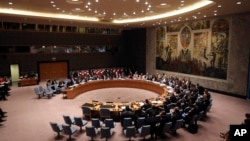UNITED NATIONS —
The U.N. Security Council will likely adopt a strong resolution Friday night that will set out the framework for how Syria will eliminate its chemical weapons arsenal. If adopted, the resolution would end more than two years of paralysis in the Security Council on Syria.
The breakthrough in the 15-nation council came late Thursday, when the U.S. and Russia reached agreement on the specifics of how this plan would be implemented.
The text was then circulated to the full council.
A vote is expected Friday evening. The council is waiting on a decision from the executive board of the Organization for the Prohibition of Chemical Weapons, the international body that will supervise the verification and destruction of Syria's arsenal. The Hague-based OPCW is expected to vote late Friday.
Its decision will be incorporated as an annex into the legally binding Security Council resolution.
U.S. Ambassador Samantha Power told reporters after Thursday evening's council meeting that the proposed resolution would impose obligations on Syria's government to eliminate its chemical weapons program.
“This resolution will require the destruction of a category of weapons that the Syrian government has used ruthlessly and repeatedly against its own people. And this resolution will make clear that there are going to be consequences for non-compliance,” she said.
Those consequences include a reference to Chapter 7 of the U.N. Charter, which makes provisions for sanctions and military action. But such action would not be automatic if Syria fails to meet its commitments, it would require the Security Council to meet and agree a new resolution with reprisals.
Since the beginning of the Syrian crisis more than two years ago, Russia has blocked any strong action against Syria. But British Ambassador Mark Lyall Grant said the new cooperation in the council, spurred by the horrendous chemical weapons attack on August 21 near Damascus that killed hundreds, should make Syria's president think twice.
“If President Assad felt that he could hide behind certain members of the Security Council, because there could not be unity in the Security Council, he will now need to think again,” he said.
Meanwhile, a team of U.N. scientific experts returned to Damascus Wednesday. They are there to investigate allegations of seven other reported poison gas attacks.
The U.N. said the team, led by Swedish scientist Ake Sellstrom, expects to finalize its activities in Syria by Monday. They are collecting documents, biomedical and environmental samples and conducting interviews with witnesses and survivors.
In a report earlier this month, the inspectors concluded there was “overwhelming” evidence that the August 21 attack used poison gas. Western countries said their intelligence pointed to Syrian government forces as being the perpetrators, but the Assad government said its armed opponents carried out the attack.
The breakthrough in the 15-nation council came late Thursday, when the U.S. and Russia reached agreement on the specifics of how this plan would be implemented.
The text was then circulated to the full council.
A vote is expected Friday evening. The council is waiting on a decision from the executive board of the Organization for the Prohibition of Chemical Weapons, the international body that will supervise the verification and destruction of Syria's arsenal. The Hague-based OPCW is expected to vote late Friday.
Its decision will be incorporated as an annex into the legally binding Security Council resolution.
U.S. Ambassador Samantha Power told reporters after Thursday evening's council meeting that the proposed resolution would impose obligations on Syria's government to eliminate its chemical weapons program.
“This resolution will require the destruction of a category of weapons that the Syrian government has used ruthlessly and repeatedly against its own people. And this resolution will make clear that there are going to be consequences for non-compliance,” she said.
Those consequences include a reference to Chapter 7 of the U.N. Charter, which makes provisions for sanctions and military action. But such action would not be automatic if Syria fails to meet its commitments, it would require the Security Council to meet and agree a new resolution with reprisals.
Since the beginning of the Syrian crisis more than two years ago, Russia has blocked any strong action against Syria. But British Ambassador Mark Lyall Grant said the new cooperation in the council, spurred by the horrendous chemical weapons attack on August 21 near Damascus that killed hundreds, should make Syria's president think twice.
“If President Assad felt that he could hide behind certain members of the Security Council, because there could not be unity in the Security Council, he will now need to think again,” he said.
Meanwhile, a team of U.N. scientific experts returned to Damascus Wednesday. They are there to investigate allegations of seven other reported poison gas attacks.
The U.N. said the team, led by Swedish scientist Ake Sellstrom, expects to finalize its activities in Syria by Monday. They are collecting documents, biomedical and environmental samples and conducting interviews with witnesses and survivors.
In a report earlier this month, the inspectors concluded there was “overwhelming” evidence that the August 21 attack used poison gas. Western countries said their intelligence pointed to Syrian government forces as being the perpetrators, but the Assad government said its armed opponents carried out the attack.




